
Stormwater
Stormwater is the water form of any type of precipitation such as rain or melted snow. Stormwater becomes a problem when excessive amounts of "runoff" water flow across the land surface.

The Problem with Stormwater

There is not just one source of pollution. It's everywhere.
Pollution
As water runoff flows across the ground's surfaces, it picks up what it touches. The further it travels over land, the more polluted it becomes.
Unless something intercepts it, the runoff carries dirt, chemicals, and other pollutants directly to our streams and waterways.
Flooding
When rain falls on hard surfaces, like roads and roofs, it runs off in channels that are not quickly absorbed. The runoff water moves far down stream to lowland areas where all the flows combine. The combined channels of water can overwhelm the infrastructure, cause erosion and flooding damage
Stormwater Solutions

There is not just one solution to pollution. It's everywhere.
Reduce Pollution Sources
-
Use natural yard care techniques.
-
Avoid pesticide use.
-
Reduce use of fertilizers.
-
Maintain septic systems.
-
Fix oil leaks.
-
Pick up pet waste.
Reduce Runoff
-
Increase water infiltration by improving the soil with compost.
-
Replace unused lawns with trees, shrubs, and other plants.
-
Water harvesting techniques, such as rain barrels and rain gardens.
-
Other L.I.D. practices, such as porous paving or “Green Roofs”.

Managing Stormwater
Low Impact Development (LID), also known as Rainscaping or Green infrastructure, is a way to prevent stormwater runoff and manage water on site.
The Basics of LID
-
Minimize site disturbance and protect native soils and vegetation
-
Use on-site natural features
-
Manage stormwater close to the source
-
Distributed stormwater Best Management Practices (BMPs)



Water cannot filter through impervious surfaces (like roads, roofs, parking lots, or even developed land that has become compacted). Water from those areas flows across the surface.
Plants decrease runoff by slowing the flow of water and helping the soil to soak up the water. Decreasing runoff reduces soil erosion and the amount of pollutants that end up in our waterways.
Preserving natural vegetated areas is one of the best ways to reduce the impact of rainwater and prevent surface water runoff.
Stormwater Solutions - "Green Infrastructure"


Rainwater Dispersion
Rain dispersal systems spread out the flow of water from impervious surfaces into pervious areas, allowing it to slow down and be absorbed into the soil.

Downspouts
can be directed to a water catchment system or directed to areas such as a rain garden, planted area, or gravel filled trench, where it can be absorbed.

Sheet Dispersion
can be used on broad paved areas such as driveways, sidewalks, etc. The pavement is gently sloped to shed water into areas such as a rain garden or planted areas.

Rainwater Catchment
Also known as rainwater harvesting or rainwater collection, it is the simple act of collecting the rainwater that runs off the hardscapes on your site for beneficial use.

Residents of Washington state may harvest rainwater without a permit as long as:
-
it's used on the property from which it was collected
-
it's collected on an existing rooftop
Washington state law even authorizes counties to reduce rates for
stormwater control facilities that utilize rainwater harvesting. Wash. Rev. Code §36.89.080.
Rainwater collection is legal in the State of Washington

Passive methods for rainwater harvesting, include infiltration basins, bio-swales, etc. that slow or stop the flow of runoff across your site. These allow stormwater to infiltrate into the ground, hydrating soils and recharging groundwater.
Active
Active rainwater harvesting catches and stores the water in one or more containers, such as barrels or cisterns for later use. With active rainwater harvesting, you control when, where, and how the water is used.
Passive
Rainwater harvesting makes the most of your resources.
During the summer months it is estimated that nearly 40 percent of household water is used for lawn and garden maintenance. A rain barrel collects water and stores it for those times that you need it most — during the dry summer months.
The average rainfall of one inch within a 24-hour period can produce more than 700 gallons of water that runs off the roof of a typical house.
Harvesting rainwater doesn't have to be a big project. It can just be one rain barrel attached to one gutter that provides convenient water for the chicken yard or for watering a flowerbed without having to drag a hose, etc.
Small systems work fine and expanding your system is fairly easy.
Start by deciding how much water you are hoping to store and where you want to locate it. Placing the barrel higher than where the water will be used allows the use of gravity instead of a pump.
It is best if barrels are able to block out any light that could enter them, to avoid growth of pathogens inside the water.


LID Landscaping (Rainscaping)
The amount of area covered by plants affects the amount of water that will infiltrate the soil.
Greater impervious areas (like roads, roofs, and parking lots) result in greater amounts of water runoff.
Plants Reduce Energy & Maintenance Costs
Shade from trees keeps homes and yards cooler in the summer.
In the winter, Trees and shrubs slow the wind and reduce wind chill.
Ground covering plants reduce the amount of water evaporating from the soil which therefore requires less water.
Soil effectively covered by plants, shades out weed seeds, so requires less maintenance than landscape with exposed soil.
Plants protect the soil from wind and water erosion and reduce the amount of pollutants that enter our waterways.
Turf grass vs other vegetation
While turf grass is better than pavement at allowing water to infiltrate the soil, research shows that areas covered with turf grass control much less water than other vegetation. Therefore, the amount of lawns and other grass areas at land development sites should be minimized. The use of plants, especially native ground cover, shrubs, and trees, can provide a low-maintenance alternative to turf grass, resulting in lower fertilizer and water needs.


Lawn Reduction Tip:
Reducing the size of excessive lawns can be done gradually over several seasons.
An easy way to start is by expanding areas already established with shrubs and trees. Start by converting areas that are difficult to mow, such as corners, edges, and under trees.
Hedgerow, Filter strip, or Vegetated buffer
A strip of plants at the edge of an area that slows surface water runoff, assists in infiltration, and prevents soil erosion.
-
Can be created by preserving existing vegetated areas over which runoff will flow or by planting new vegetation.
-
Should be located immediately downstream of roadways and parking lots for pollutant removal, groundwater recharge, and runoff volume reduction.
-
When located along streams, creeks, and other waterways can help mitigate thermal runoff impacts and provide wildlife habitat.




Rain Gardens
A rain garden is a landscaped depression in the land, with soil designed to help rainwater runoff from a roof, driveway or other impervious surfaces to soak into the ground and be filtered.

Bioretention Cells, Bioswales, and some Hedgerows are sometimes referred to as "Rain Gardens", because they are doing much the same thing in different situations. For example, a "Bioswale" is a kind of rain garden where water is slowed and filtered, but much of the water is directed to another location.
Bioretention is a more complex rain garden with drainage systems and amended soils.
Hedgerows are not technically rain gardens but can be used to slow surface water as it heads down slope, as an edge to a Bioswale, or as check dam.
A Bioretention cell (strip or trench) is more complex rain garden with engineered drainage systems constructed in a slightly recessed landscaped area with a specialized soil mixture, an aggregate base, an underdrain, and site-appropriate plants.

Bioretention
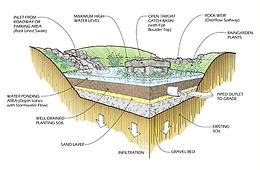

A bioswale is a slightly recessed landscaped area constructed downstream of a runoff source. At the beginning of a rain event, a bioswale absorbs and filters water runoff. Once the soil-plant mixture below the channel becomes saturated, the swale acts as a conveyance structure to a bioretention cell, wetland, or infiltration area.
There is a range of designs for these systems. Some swales are designed to filter pollutants and promote infiltration and others are designed with a geo-textile layer that stores the runoff for slow release into depressed open areas or an infiltration zone.
Bioswale



Curb cuts are a way to retrofit old stormwater systems. Openings are made in curbs to allow water to flow away from roads and parking lots and into raingardens or planted areas where the water can filter into the soil. This benefits the local groundwater systems and reduces the stormwater load downstream.
Curb Cut Extension

Curb Cut Raingarden

Curb Cut Inlet

Rain gardens are designed to be self-sufficient. Some weeding and watering will be needed in the first two years, and perhaps some thinning in later years as the plants mature, but a well-planned raingarden can be maintained with little effort after the plants are established. Rain gardens do not require fertilization.
Rain gardens' function depends on soil and local weather conditions. Take the time to plan effectively.
Note: Don’t locate a rain garden within 10 feet of a building foundation, near the edge of a steep slope or bluff, in low spots that do not drain well, where groundwater is within one foot of the bottom of the finished rain garden, over a septic drain field or tank, over shallow utilities (call before you dig), or in areas that would require disturbing healthy native soils and vegetation. If the garden is near the road, select plants that maintain visibility. More information
Rain Garden Design Tips
Make it part of the landscape. It should work together with and be visually and functionally integrated into the rest of the landscape.
Choose a shape. Consider all the rules of composition, screening, and circulation—not just the rule that says to put a rain garden in a low spot 10 feet from the house.
Integrate with other gardens. Consider making a depression within a perennial bed or shrub border (especially if space is tight and you don’t have room for a larger rain garden that stands alone).
Create repetition. If a large rain garden won't do, consider making several smaller raingardens.
Rain Garden Maintenance -New
-
New plantings require extra care during the first 1-3 years.
-
Make sure new plants receive a deep watering 1 or 2 times per week for the first several months and then at least once per week for the first year.
-
Apply a good layer of mulch to maintain soil moisture and reduce weeds.

Good maintenance while the garden is becoming established is important.


Rain Garden Maintenance -Yearly
Keep the Flow
Check the Inlet
-
At least twice a year, check around the inlet and overflow areas for debris build-up such as leaves, sticks, and other items.

Water flowing into the rain garden can carry with it various types of debris that can clog the soil mix and slow drainage.
-
Maintain a cover of decorative rock around the inlet and overflow area to protect the soil.
-
Look for areas where water may not be soaking into the ground. This may be due to fine sediment or compaction of the soil.
-
Remove sediment that may be building up and rake the soil surface. If you suspect compaction, break up and loosen the soil when it is not saturated.


Maintain soil coverage
-
Every year check the mulch layer and, if needed, apply enough to maintain a layer of shredded or chipped wood mulch that is about 3 inches deep all throughout your rain garden—on the bottom, the sides, and around the perimeter.
-
Replace any dead plants to fill in holes
Like mulch, full coverage of plants provides multiple benefits for rain gardens by helping to:
-
Keep the soil moist.
-
Replenish organic material in the soil.
-
Prevent erosion.
-
Discourage weeds
Maintenence Tips
-
Edging (such as pavers, stones, etc.) can facilitate access for maintenance and provide separation from lawn and other landscaped areas.
-
To maintain access to the middle of the garden for weeding and other tasks. A few strategically placed flat rocks or pavers can allow access without compacting the soil or leaving room for weeds.
-
Pull weeds early when the soil is moist and the weeds are small. Don't let them go to seed.
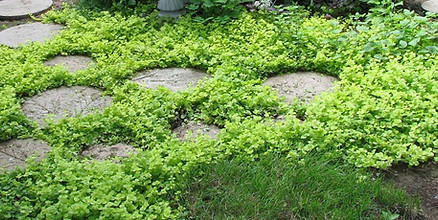


Permeable Pavement
Permeable pavement is a type of pavement with a porous surface that is composed of concrete, open pore pavers, or asphalt with an underlying stone reservoir. It allows water to run through it rather than accumulate on it or run off of it. The water slowly infiltrates the soil below or is drained via a drain tile. The stone or gravel acts as a natural filter and clears the water of pollutants. It is important to note that one size does not fit all - there are many pros and cons for use of each type of permeable pavements.


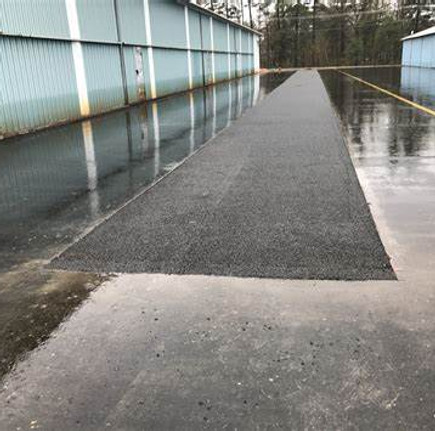
Permeable Pavers



Can be PICP (impermeable pavers with permeable joints/openings between) or AGGs (permeable pavers made up of aggregate material)
-
Flexible and proprietary.
-
Appropriate for: Residential and light commercial use, trails, pedestrian paths, and driveways. Capable of high vehicle loads. Used for lower speeds.
-
Construction Minimum layer requirements: Pavers on top of an aggregate base that is installed above infiltrating soils.
-
Easily replaced due to interlocking structure. Can be restored easily because gravel in voids can be replaced.
-
Maintenance: Sweep or vacuum when surface and debris are dry, 1-2x annually, Occasional pressure washing, as prescribed by manufacturer. Replace joint aggregate as needed.
Pervious Concrete

-
The only permeable pavement that is rigid.
-
Appropriate for: Heavier traffic loads. Works well for parking lots, bike lanes, driveways, and sidewalks.
-
Construction Minimum layer requirements: 6-inch minimum pervious concrete wearing layer on top of a 6-inch sand layer, with an aggregate base that is installed over infiltrating soils. Placement differs from conventional concrete—small batches of pervious concrete are feasible.
-
Maintenance: Prevent sediment from collecting on pavement. Clean surface annually with a combination of suction and sweeping.
-
General comparisons: Pervious concrete has less strength than conventional materials. Unless properly designed, it is more susceptible to freeze-thaw damage than porous asphalt. Sand should not be used for snow and ice conditions, but salt and deicing chemicals can be used in moderation.
Porous Asphalt
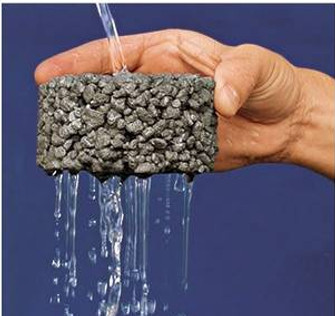
-
Flexible, non-proprietary (Similar to conventional asphalt, but fines in the mix smaller than ASTM sieve size # 30 sieve are reduced, if not eliminated.)
-
Appropriate for: Parking lots and streets with low-weight axle loads and light traffic volumes mostly due to inability to withstand rutting (e.g. local access residential roads, trails).
-
Recent experiments to incorporate fibers (Kevlar, carbon composite) have proved promising and suggest that these additives can expand porous asphalt applications to heavier traffic conditions.
-
Construction Minimum layer requirements: 4-inch minimum porous asphalt wearing layer on top of 6-inch sand layer, with an aggregate base that is installed over infiltrating soils.
-
Maintenance: Prevent sediment from collecting on pavement. Clean surface twice a year with a combination of suction and sweeping.
-
General comparisons: Porous asphalt has reduced strength compared to conventional asphalt and will not be appropriate for applications with high volumes and extreme loads. However, these pavements have less freeze-thaw stress than conventional pavements. Sand should not be used on these pavements, and salt and deicing chemicals must be used in moderation.
Plastic Grid
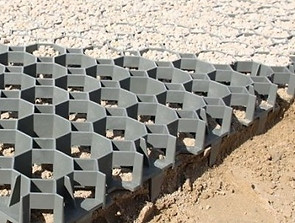

Series of interlocking plastic or synthetic grid filled with gravel or soil and can be planted with vegetation such as grass.
-
Flexible and proprietary.
-
Appropriate for trails, paths, maintenance access roads in parks, and parking lots. Capable of high vehicle loads. Best suited for low speeds and infrequent vehicular traffic
-
Construction Minimum layer requirements: Concrete or rigid plastic grids filled with topsoil/grass or gravel over an aggregate base that is installed over infiltrating soils.
-
Maintenance: May need to replace or replenish gravel if clogged or depleted.



Summary of Permeable Pavement Design Requirements
These site and design requirements can help you decide if permeable pavement might be appropriate for your project.
-
Permeable pavement is allowed on surfaces with slopes no greater than 5 percent.
-
Underlying soils should have a minimum infiltration rate of 2 inches per hour.
-
There are no setback requirements for permeable pavement.
-
There must be 5 feet between the high groundwater level and the excavated bottom.
-
The subgrade next to structures should slope away from the structures.
-
Use a minimum of 6 inches of washed, crushed 2- to ¾-inch or No. 57 rock under concrete or asphalt.
-
Consult the Stormwater Management Manual regarding required edge restraints.
For best results, keep in mind the following construction considerations:
-
Protect the subgrade from over-compaction during excavation.
-
Do not excavate or compact the native subgrade in wet conditions.
-
Consider the sequence of construction activities to protect the subgrade from traffic.
-
Protect the paving from construction traffic and sediment after installation.
When to Call a Professional
Call a professional designer if you have more vehicle traffic than a residential driveway.
Also, if your soil infiltration rate is less than 2 inches per hour, you will need to hire a designer to help you.

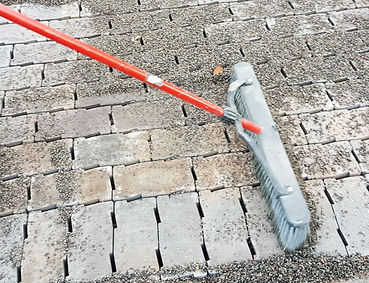

-
Prevent Clogging of Pavement Surface with Sediment
-
Vacuum pavement twice per year
-
Maintain planted areas adjacent to pavement
-
Immediately clean any soil deposited on pavement
-
Do not allow construction staging, soil/mulch storage, etc. on unprotected pavement surface
-
Clean inlets draining to the subsurface bed twice per year
-
-
Snow/Ice Removal
-
Porous pavement systems generally perform better and require less treatment than standard pavements
-
Do not apply abrasives such as sand or cinders on or adjacent to porous pavement
-
Snow plowing is fine but should be done carefully (i.e. set the blade slightly higher than usual)
-
Salt application is acceptable, although more environmentally-benign deicers are preferable
-
-
Repairs
-
Surface should never be seal-coated
-
Damaged areas less than 50 sq. ft. can be patched with porous or standard asphalt
-
Larger areas should be patched with an approved porous asphalt
-
Special Maintenance Considerations

WSU "Catching Rain" Fact Sheets
Click logos below for stormwater information related to location.

_edited.jpg)











